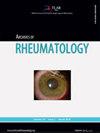土耳其语版马萨诸塞综合医院认知和身体功能问卷:信度和效度研究
IF 1.1
4区 医学
Q4 Medicine
引用次数: 0
摘要
调查目的麻省总医院认知和身体功能问卷(CPFQ)是一份同时评估认知和身体功能的问卷。目前尚未对土耳其版 CPFQ 的可靠性和有效性进行研究。在本研究中,我们旨在通过将 CPFQ 翻译成土耳其语并进行文化适应性调整,分析土耳其语版 CPFQ 在纤维肌痛综合征(FM)患者中的有效性和可靠性。 患者和方法:根据 ACR-2016 FM 诊断标准向 Ondokuz Mayıs 大学医学院物理医学与康复系申请并被诊断为 FM 的 117 名 18 岁以上患者在自愿的基础上被纳入研究,这些患者已书面同意参与研究。CPFQ 被翻译成土耳其语以适应土耳其语。5 名患者和 5 名医护人员对获得的土耳其语版本的可理解性进行了评估,并编制了问卷的最终版本。对患者进行了迷你精神状态检查 (MMSE)、纤维肌痛影响问卷 (FIQ) 和医院焦虑抑郁量表 (HADS),这些问卷在土耳其语中被证明是可靠有效的。为了保证测试-重测的可靠性,对土耳其语版 CPFQ 进行了 2 次填写,每次间隔 1 周。内部一致性通过计算克朗巴赫α进行评估。通过观察土耳其语版 CPFQ 的总分与 MMSE 评分、HADS 抑郁和焦虑评分以及 FIQ 评分之间的相关性来评估有效性。 结果显示在内部一致性评估中,所有亚组的 Cronbach's alpha 都很高。在测试-再测可靠性方面,CPFQ 亚组的类内相关系数较高。CPFQ 与 HADS 抑郁症呈显著正相关,与 HADS 焦虑症和 FIQ 呈中度正相关。CPFQ 与 MMSE 之间存在明显但较弱的负相关。虽然 MMSE 与 FM 疾病活动和 HADS 焦虑之间没有明显的相关性,但与 HADS 抑郁之间存在明显但较弱的负相关。 结论本研究表明,土耳其版 CPFQ 对 FM 患者具有较高的信度和效度。结论是 CPFQ 可用于土耳其 FM 患者。本文章由计算机程序翻译,如有差异,请以英文原文为准。
TURKISH VERSION OF MASSACHUSETTS GENERAL HOSPITAL COGNITIVE AND PHYSICAL FUNCTIONING QUESTIONNAIRE: A RELIABILITY AND VALIDITY STUDY
Objectives: Massachusetts General Hospital Cognitive and Physical Functioning Questionnaire (CPFQ) is a questionnaire which evaluates both cognitive and physical functions together. Reliability and validity of the Turkish version of CPFQ is not studied yet. In this study, we aimed to analyze the validity and reliability of the Turkish version of CPFQ in patients with fibromyalgia syndrome (FM) by translating and culturally adapting the CPFQ to Turkish. Patients and Methods: 117 patients over the age of 18, who applied to Ondokuz Mayıs University Faculty of Medicine, Department of Physical Medicine and Rehabilitation and were diagnosed with FM according to ACR-2016 FM diagnostic criteria, and gave written consent to participate in the study, were included in the study on a voluntary basis. CPFQ was translated into Turkish to adapt the questionnaire to Turkish. The intelligibility of the obtained Turkish version was evaluated by 5 patients and 5 healthcare professionals, and the final form of the questionnaire was prepared. Mini Mental State Examination (MMSE), Fibromyalgia Impact Questionnaire (FIQ), and Hospital Anxiety and Depression Scale (HADS), which were proven to be reliable and valid in Turkish, were administered to the patients. For test-retest reliability, the Turkish version of the CPFQ was filled in 2 times with an interval of 1 week. Internal consistency was evaluated by calculating Cronbach's alpha. Validity was evaluated by looking at the correlations between the total score obtained from the Turkish version of CPFQ and the MMSE score, HADS depression and anxiety scores, and FIQ score. Results: In the evaluation of internal consistency, Cronbach's alpha was found to be high in all subgroups. In test-retest reliability, intraclass correlation coefficient was high in CPFQ subgroups. CPFQ showed a significant positive correlation with HADS depression and moderately positive correlation with HADS anxiety and FIQ. A significant but weak, negative correlation was detected between CPFQ and MMSE. While there was no significant correlation between MMSE and FM disease activity and HADS anxiety, there was a significant but weak, negative correlation between HADS depression. Conclusion: In this study, the Turkish version of CPFQ was shown to have high reliability and validity in FM patients. It was concluded that CPFQ could be applied to Turkish patients with FM.
求助全文
通过发布文献求助,成功后即可免费获取论文全文。
去求助
来源期刊

Archives of rheumatology
Medicine-Rheumatology
CiteScore
2.00
自引率
9.10%
发文量
15
期刊介绍:
The Archives of Rheumatology is an official journal of the Turkish League Against Rheumatism (TLAR) and is published quarterly in March, June, September, and December. It publishes original work on all aspects of rheumatology and disorders of the musculoskeletal system. The priority of the Archives of Rheumatology is to publish high-quality original research articles, especially in inflammatory rheumatic disorders. In addition to research articles, brief reports, reviews, editorials, letters to the editor can also be published. It is an independent peer-reviewed international journal printed in English. Manuscripts are refereed by a "double-blind peer-reviewed" process for both referees and authors.
Editorial Board of the Archives of Rheumatology works under the principles of The World Association of Medical Editors (WAME), the International Council of Medical Journal Editors (ICMJE), and Committee on Publication Ethics (COPE).
 求助内容:
求助内容: 应助结果提醒方式:
应助结果提醒方式:


